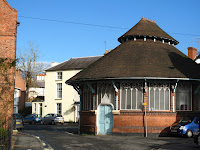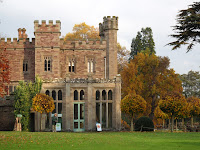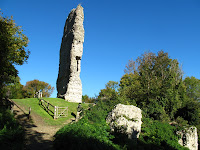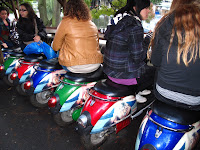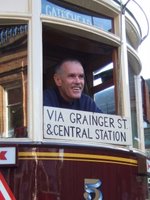Thursday, November 11, 2010
Last look at autumn - 7th November 2010
Before leaving Hereford, we did the river walk again in the morning sun. We were out quite early, but not as early as the fishermen along the bank
The next city north of Hereford, is Leominster and from here we did a circular tour taking in Tenbury Wells and Ludlow before stopping at Croft Castle.
The original castle on this site was commissioned by William the Conqueror, as part of a string of castles protecting the Welsh border. Before looking around the present castle, which dates back to the 17th century, we joined a history talk about the castle. This was interesting, as the original owner was Croft but it passed out of the family's hands when a future owner lost his fortune in the South Sea investment bubble. But after 180 years, the Crofts finally bought the castle back after World War I.
From Croft Castle, we travelled south to Hampton Court. This is a stunning castle, totally restored by the American owners who purchased it in 1994. They developed a series of walled gardens, with water features and a tricky maze. The castle was surrounded by wonderful autumn trees – quite stunning.
Wye Not? - 6th November 2010
We had a weekend planned in Hereford, to catch the last of the autumn colours, so when 25mph winds ripped through the UK on Thursday, we wondered if there would be any leaves left on the trees. But when we reached our autumn feature for the day, The Forest of Dean, we were delighted to find the trees looking superb, with their rich golds, reds and bronzes.
We took the scenic route through the forest, with a stop for a walk at Symonds Yat Rock. This is a massive rock outcrop about the River Wye, overlooking the forests below, the town of Symonds Yat and the river curving in a horse-shoe. The trees were a wonderful autumn blaze of colour.
Our route took us past Goodrich Castle, ruined by Cromwell's troops, and on to Ross-on-Wye for lunch. This is a picturesque market town, with a covered market, the main street marching down the hill, and a soaring church steeple. Outside the church is a cross erected to commemorate the fact that in 1637 a total of 315 plaque victims were buried without coffins during the night. Next door to the church is a walled garden, overlooking the river, far below.
After lunch, we carried on to Hereford, parked at our city centre hotel and walked off to enjoy the town centre with its old buildings. The Tudor 'Old House' is a free museum, which gives a feel for how these old buildings were to live in.
The cathedral is magnificent, we have previously visited the Mappa Mundi and Chained Library here, definitely worth a visit.
The city is also built on the banks of the Rive Wye and, here too, we enjoyed the autumn colours as we walked along the riverside path before returning to our hotel.
We took the scenic route through the forest, with a stop for a walk at Symonds Yat Rock. This is a massive rock outcrop about the River Wye, overlooking the forests below, the town of Symonds Yat and the river curving in a horse-shoe. The trees were a wonderful autumn blaze of colour.
Our route took us past Goodrich Castle, ruined by Cromwell's troops, and on to Ross-on-Wye for lunch. This is a picturesque market town, with a covered market, the main street marching down the hill, and a soaring church steeple. Outside the church is a cross erected to commemorate the fact that in 1637 a total of 315 plaque victims were buried without coffins during the night. Next door to the church is a walled garden, overlooking the river, far below.
After lunch, we carried on to Hereford, parked at our city centre hotel and walked off to enjoy the town centre with its old buildings. The Tudor 'Old House' is a free museum, which gives a feel for how these old buildings were to live in.
The cathedral is magnificent, we have previously visited the Mappa Mundi and Chained Library here, definitely worth a visit.
The city is also built on the banks of the Rive Wye and, here too, we enjoyed the autumn colours as we walked along the riverside path before returning to our hotel.
Monday, November 01, 2010
No tricks, all treats – 30 October 2010
Autumn colours are almost like a drug; if the sun is shining, we have to get out for another 'fix'. The only place free of showers today was north of London, so we headed for Braintree, and enjoyed a circular drive taking in Sudbury and Nayland.
One hidden gem we discovered on the way to Sudbury, was Wissington. This hamlet has an 11th century church down a no exit, tiny road, is such a tranquil spot, it made us feel like a million miles from London. Inside the church are 13th century wall paintings, the one which really appealed was a very stylish dragon (no sign of St George though).
appealed was a very stylish dragon (no sign of St George though).
Sudbury is the home town of Thomas Gainsborough, the famous 18th century painter. We visited the house where he was born and grew up. It has now been turned into an art gallery, displaying, predominately, Gainsborough's paintings.
After passing through several picturesque villages, all painted in pastel colours, we arrived in Stratford St Mary. We had a five mile walk starting at the tudor Le Talbooth restaurant, once featured in a painting by Constable. It is still a fabulous spot, although spoilt by the busy roads nearby. Before the walk, we had a superb lunch at Milsoms, the sister restaurant around the corner.
The circular walk took in parts of the Essex Way, and returned by the Stour Walkway. There was still time in the day to complete our drive through Earls Colne to Halstead. The most interesting part of Halstead is beside the River Colne, where the old silk mills are now used as an antiques centre.


For the eve of Halloween, we were delighted to have been treated to excellent weather, as half way home we ran onto very wet roads, obviously the forecast was right, convincing us to go far enough north to be out of reach of the passing showers
One hidden gem we discovered on the way to Sudbury, was Wissington. This hamlet has an 11th century church down a no exit, tiny road, is such a tranquil spot, it made us feel like a million miles from London. Inside the church are 13th century wall paintings, the one which really
 appealed was a very stylish dragon (no sign of St George though).
appealed was a very stylish dragon (no sign of St George though).Sudbury is the home town of Thomas Gainsborough, the famous 18th century painter. We visited the house where he was born and grew up. It has now been turned into an art gallery, displaying, predominately, Gainsborough's paintings.
After passing through several picturesque villages, all painted in pastel colours, we arrived in Stratford St Mary. We had a five mile walk starting at the tudor Le Talbooth restaurant, once featured in a painting by Constable. It is still a fabulous spot, although spoilt by the busy roads nearby. Before the walk, we had a superb lunch at Milsoms, the sister restaurant around the corner.
The circular walk took in parts of the Essex Way, and returned by the Stour Walkway. There was still time in the day to complete our drive through Earls Colne to Halstead. The most interesting part of Halstead is beside the River Colne, where the old silk mills are now used as an antiques centre.


For the eve of Halloween, we were delighted to have been treated to excellent weather, as half way home we ran onto very wet roads, obviously the forecast was right, convincing us to go far enough north to be out of reach of the passing showers
Thursday, October 28, 2010
Autumn at the seaside - 24 October 2010
A fabulous sunny day, after the second frost of the season, seemed the perfect time to visit a British seaside city, so we did a circular drive starting from the bottom of the M23 down to Worthing.
Our morning-tea stop was by the ruins of Bramber Castle. One of the many fascinating places with just a few bits of castle walls left behind.
Before reaching the coast, we detoured to have a look at the chapel at Lancing College. This private school, has a beautiful chapel which is open daily to the public. Building started in 1868 in 14th C Gothic style like the grand university chapels, but looking almost new, this chapel is truly beautiful, and worth the detour.
Worthing has a seafront typical of many British towns, the main features are the wide stony beach, a promenade, beach huts,Victorian rows of fine boarding houses and the pier, once used for shipping, but now a place to find food and amusements. It's a great place to spend time on a slightly chilly day.
We continued our tour through the wonderful town of Arundel, to Parham House. This magnificent Elizabethan house was bought and restored by the present owners family in 1922. The house is full of well preserved antique embroideries, collected by the original restorers.
The last stop of the day was Shipley to check out Hillare Belloc's windmill. I think living beside this would inspire anyone, although the rest of the tiny village of Shipley was extremely boring.
Our morning-tea stop was by the ruins of Bramber Castle. One of the many fascinating places with just a few bits of castle walls left behind.
Before reaching the coast, we detoured to have a look at the chapel at Lancing College. This private school, has a beautiful chapel which is open daily to the public. Building started in 1868 in 14th C Gothic style like the grand university chapels, but looking almost new, this chapel is truly beautiful, and worth the detour.
Worthing has a seafront typical of many British towns, the main features are the wide stony beach, a promenade, beach huts,Victorian rows of fine boarding houses and the pier, once used for shipping, but now a place to find food and amusements. It's a great place to spend time on a slightly chilly day.
We continued our tour through the wonderful town of Arundel, to Parham House. This magnificent Elizabethan house was bought and restored by the present owners family in 1922. The house is full of well preserved antique embroideries, collected by the original restorers.
The last stop of the day was Shipley to check out Hillare Belloc's windmill. I think living beside this would inspire anyone, although the rest of the tiny village of Shipley was extremely boring.
Wednesday, October 27, 2010
150th Anniversary – 23 October 2010
London's canal system provides a very scenic walking/cycling route around London, and today we set out to walk half of the Regents Canal, a 13 mile canal around the centre of London to the docks.
We joined the canal at 'Little Venice' near the Warwick Ave tube station. This area is home to many permanently moored narrow-boats. In fact they have their own private tow path running alongside. Further along the tow path is open to the public, but access is only until 6pm (or dusk in winter), which must ensure security, as we saw many 'back-yards' and 'sheds' set up beside the tow path.
The direct route for the canal would have been directly through Regents Park, but it was deemed undesirable to have the coarse sights of trade passing through this very high class housing/recreation area, and the canal had to detour around the back of the Park. Today of course, this same canal has attracted apartment blocks simply to enjoy the canal-side views.
After passing London Zoo, we took a detour from our route to have lunch at The Albany, on the other side of the Park. Having read this week, that fish & chips are now 150 years old, we decided to celebrate this anniversary, and The Albany does an excellent traditional pub dish of 'Fish & Chips with minted mushy peas and tartare sauce'. Yummy! We enjoyed our celebration of the 150th, a little older, historically, than last weeks 80th.
The walk took us next through three markets, the first – Camden Market – is soon after leaving Regents Park. Camden Market is a wonderful place to wander around, enjoying the colourful displays of both food and goodies for sale, as well as the colourful characters.
The canal then wended its way through areas with a more industrial heritage, to Islington, via Kings Place, a music venue and art gallery, also an lovely canal-side stop for coffee.
The final two markets at Islington were Chapel Market, a typical small London street market, and Camden Passage, a series of wonderful shops and some market stalls, as interesting, although not as large as Camden Market.
We joined the canal at 'Little Venice' near the Warwick Ave tube station. This area is home to many permanently moored narrow-boats. In fact they have their own private tow path running alongside. Further along the tow path is open to the public, but access is only until 6pm (or dusk in winter), which must ensure security, as we saw many 'back-yards' and 'sheds' set up beside the tow path.
The direct route for the canal would have been directly through Regents Park, but it was deemed undesirable to have the coarse sights of trade passing through this very high class housing/recreation area, and the canal had to detour around the back of the Park. Today of course, this same canal has attracted apartment blocks simply to enjoy the canal-side views.
After passing London Zoo, we took a detour from our route to have lunch at The Albany, on the other side of the Park. Having read this week, that fish & chips are now 150 years old, we decided to celebrate this anniversary, and The Albany does an excellent traditional pub dish of 'Fish & Chips with minted mushy peas and tartare sauce'. Yummy! We enjoyed our celebration of the 150th, a little older, historically, than last weeks 80th.
The walk took us next through three markets, the first – Camden Market – is soon after leaving Regents Park. Camden Market is a wonderful place to wander around, enjoying the colourful displays of both food and goodies for sale, as well as the colourful characters.
The canal then wended its way through areas with a more industrial heritage, to Islington, via Kings Place, a music venue and art gallery, also an lovely canal-side stop for coffee.
The final two markets at Islington were Chapel Market, a typical small London street market, and Camden Passage, a series of wonderful shops and some market stalls, as interesting, although not as large as Camden Market.
Thursday, October 21, 2010
MG80 Part Two – 17 October 2010
 Today we joined up with the official MG Car Club Headquarters' celebration, which started at Roebuck Inn, the site of the first open meeting of the Club. After morning tea, we left from here to do a scenic route to lunch at the Lambert Arms. This was also a historic choice, as it was the base for many pre-war trials events.
Today we joined up with the official MG Car Club Headquarters' celebration, which started at Roebuck Inn, the site of the first open meeting of the Club. After morning tea, we left from here to do a scenic route to lunch at the Lambert Arms. This was also a historic choice, as it was the base for many pre-war trials events.The excellent 3 course lunch was in a conference room set aside especially for the Club members. After lunch, there was just enough time for the second part scenic drive around the Chilterns, to finish at Kimber House, Abingdon. The MG Club Headquarters' route was very scenic on a beautiful autumn day.
We arrived at Kimber house in time for afternoon tea, and the cutting of the official cake. People had come from all around the SE region to this celebration. We learnt that the idea had originated with a New Zealander who visited Abingdon headquarters a year ago. Links to all the clubs' celebrations worldwide can be found here.
Wednesday, October 20, 2010
MG80 Part One – 16 October 2010
All around the world this weekend, local branches of the MG Car Club celebrated the 80th birthday of the Club. Today we joined with the SE Centre Club, who chose a celebration based around the theme of the Greenwich Meridian Line, as it is an international event and the SE Centre is one of only three Centres that the Meridian crosses. The venue they choose to celebrate in was the Bluebell Railway, as the Meridian Line crosses through the Sheffield Park Station, at the start of the 19 mile steam train line.
As the railway is next door to the Sheffield Park Gardens, we left London early enough, to enjoy a stroll around the gardens. These are very popular in the autumn, when the red and golds of the foliage contrasts beautifully with the blues of the sky and lakes.
Once we had finished enjoying the gardens, we moved on to the Bluebell Railway for the MG event. After admiring the MG's in the car park, we took a ride on the 1pm steam train, and enjoyed our table for two, in a spacious uncrowded carriage. At Horsted Keynes, we decided to explore the town, before the 2pm train came through to continue our journey. Unfortunately, this was a bad move, as the town turned out to be 1.5 miles from the station, and when the 2pm train arrived, it was chockka full, with the unexpectedly high numbers of MG enthusiasts. We were rather fortunate to actually find a seat.
On our return we formed a small convoy for a scenic trip back through the narrow country lanes to the M25.
As the railway is next door to the Sheffield Park Gardens, we left London early enough, to enjoy a stroll around the gardens. These are very popular in the autumn, when the red and golds of the foliage contrasts beautifully with the blues of the sky and lakes.
Once we had finished enjoying the gardens, we moved on to the Bluebell Railway for the MG event. After admiring the MG's in the car park, we took a ride on the 1pm steam train, and enjoyed our table for two, in a spacious uncrowded carriage. At Horsted Keynes, we decided to explore the town, before the 2pm train came through to continue our journey. Unfortunately, this was a bad move, as the town turned out to be 1.5 miles from the station, and when the 2pm train arrived, it was chockka full, with the unexpectedly high numbers of MG enthusiasts. We were rather fortunate to actually find a seat.
On our return we formed a small convoy for a scenic trip back through the narrow country lanes to the M25.
Subscribe to:
Comments (Atom)

